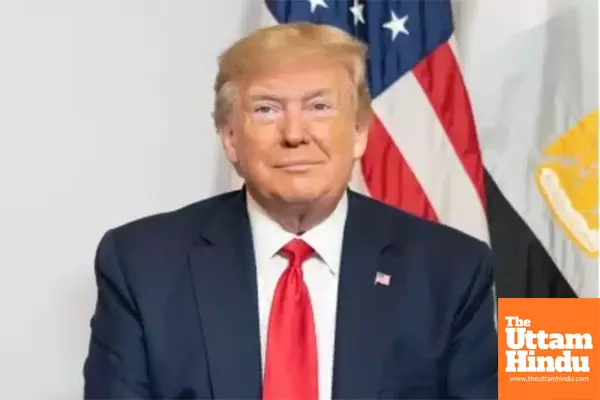Trump's Kashmir proposal: Dangerous diplomacy in a sensitive South Asian dynamic

New Delhi(The Uttam Hindu): On May 10, US President Donald Trump once again inserted himself into the India-Pakistan equation, this time in the wake of the latest ceasefire declared between the two nuclear neighbours. Announcing through a social media post that the United States played a mediating role, Trump also proclaimed his intention to "work with both nations on a Kashmir solution", a statement that echoed similar remarks made in February 2020. Then too, during the Trump-Imran Khan meeting at Davos, he had offered to mediate on Kashmir, drawing firm resistance from India.
Trump's latest offer may seem like an impromptu gesture of diplomacy. But for India, it rings alarm bells. It appears less of a benign intervention and more of a hazardous proposition - one that could have deep ramifications not only for Indian sovereignty, but also for the broader balance of power in South Asia.
India has consistently rejected third-party mediation on Kashmir. For New Delhi, the matter is internal and bilateral, one to be discussed, if at all, only with Islamabad. The 1972 Shimla Agreement and the 1999 Lahore Declaration reaffirm this position. Any hint of outside involvement, especially from a power like the United States, is viewed as an infringement on India's strategic autonomy and territorial integrity.
That Trump would revive the idea, despite knowing India's steadfast position, raises a critical question: What does Washington stand to gain from reigniting the Kashmir issue under the garb of peacemaking?
The answer may lie not in Trump's eccentricities but in America's long-term strategic calculus in Asia. Jammu and Kashmir, despite being politically sensitive, occupies a piece of real estate of immense geopolitical significance. Flanked by China to the east, Pakistan to the west, and lying close to Iran, Afghanistan, Central Asia, and the Middle East, it offers a vantage point for influence across several regions. For the US, particularly under a leadership driven by transactional diplomacy, Kashmir is not just a conflict zone, it is a potential foothold. As America recalibrates its presence after exiting Afghanistan, it is searching for a new regional anchor to counterbalance China's Belt and Road Initiative (BRI) and Russia’s renewed influence in Eurasia. Kashmir, situated at the intersection of all these forces, becomes a tempting geopolitical lever.
Trump's comments must also be seen against the backdrop of the US withdrawal from Afghanistan. With the Taliban back in Kabul and Chinese investments pouring into Pakistan under the China-Pakistan Economic Corridor (CPEC), the US is being slowly pushed out of the traditional strategic corridors of South Asia. Re-engaging with the India-Pakistan conflict allows Washington to remain relevant, even indispensable, in regional geopolitics.
Further, positioning the US as a 'mediator' in Kashmir may serve to woo Pakistan, an old ally, back into partial alignment, or at least out of China's tight embrace. Simultaneously, offering increased trade to India helps maintain a balance. But this balancing act is fraught with contradictions and risks antagonising New Delhi.
India, under any government, especially one with a strong nationalist mandate, is unlikely to accept US mediation, directly or implicitly. The messaging from New Delhi after the ceasefire was clear: the understanding was reached directly with Islamabad. Trump's attempt to take credit for what India sees as a bilateral success undermines that narrative and may even harden India's resolve to resist external involvement.
Moreover, Trump's style of flamboyant diplomacy, often devoid of nuance, poses its challenges. By projecting a ceasefire as a prelude to solving Kashmir, what he termed a "thousand-year" conflict, he trivialises both its complexity and its human cost. This not only stokes sentiment within India but risks derailing quiet diplomatic progress.
In a multipolar world, strategic trust is a rare currency. India, over the past decade, has gradually tilted toward the US, sharing concerns over Chinese assertiveness, deepening defence ties, and expanding economic cooperation. But actions like these force India to re-evaluate how much it can depend on Washington. As an Indian proverb loosely translates, one loyal friend is better than a hundred opportunists. India may be compelled to invest more in regional alliances and self-reliance than in the idea of American partnership.
The larger danger is not in what Trump says but in what such statements trigger. By internationalising Kashmir once again, however unintentionally, the US may embolden Pakistan's strategic posturing or give room to China to advance its interests in Ladakh and beyond. It could also fuel radical narratives and militancy, setting back years of hard-earned stability.
In the end, while Trump may style himself as a dealmaker on the global stage, Kashmir is not real estate; it is a land soaked in history, identity, and blood. It cannot be fixed through tweets or trade deals.
For India, the message is clear: it must remain vigilant against well-meaning but misguided interventions, and resolute in protecting the sanctity of its national interests, through diplomacy, deterrence, and above all, dialogue on its terms.
